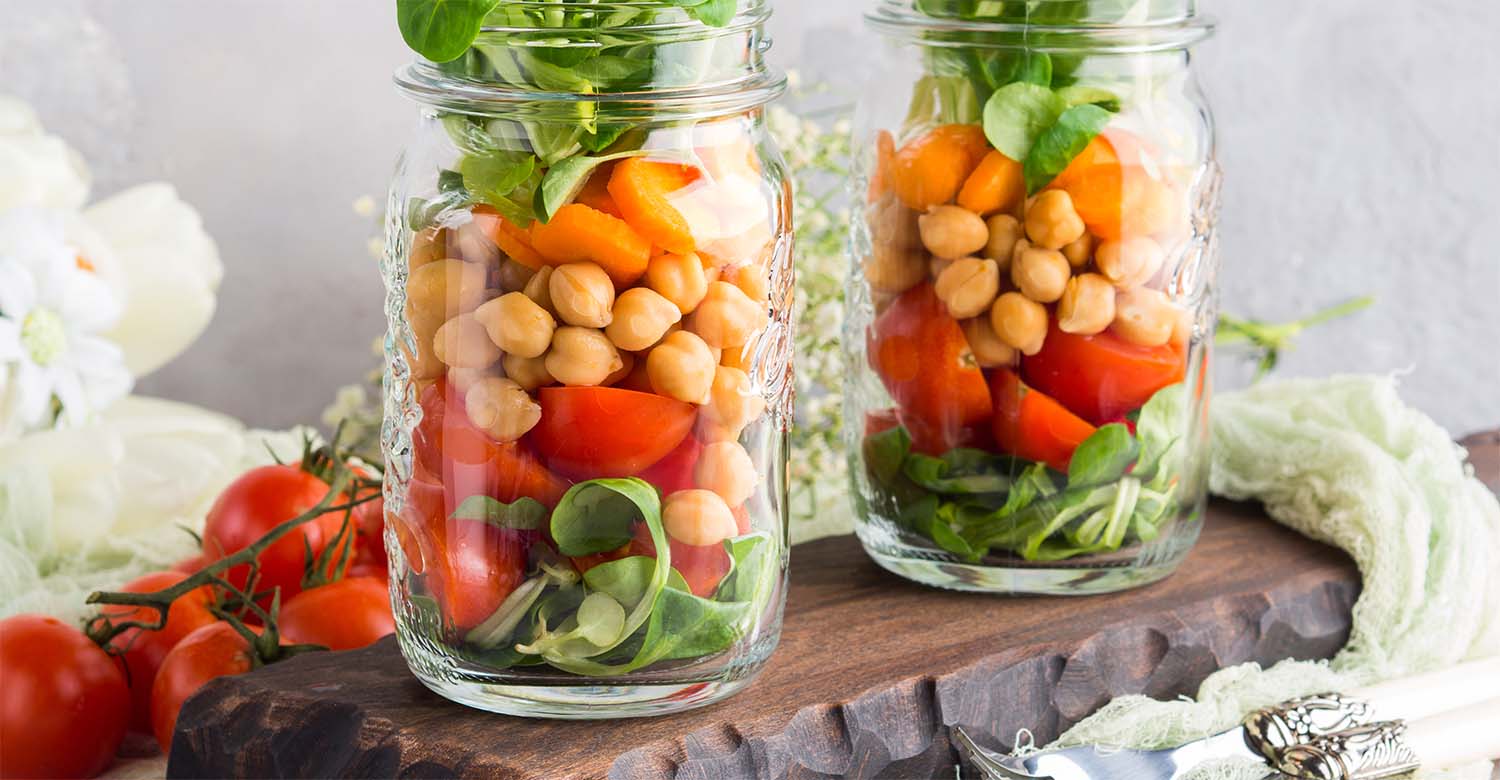
How to PREP MEALS: ideas and practical tips
The art of organising the various meals of the week, planning in advance what to serve at table from Monday to Sunday, meal prepping is a smart, economic and anti-stress method of advance food preparation concentrated in one single moment, which is becoming increasingly popular.
This domestic planning tool that allows you to optimise time spent on cooking while also saving money, reducing waste and offering variety in dishes, can be quite useful for everyone but is even more strategic in light of the spread of flexitarian diets (also known as “flexible vegetarianism”), a trend which first took root in the United States and is now establishing itself in Italy.
Derived directly from the healthy and clean eating philosophy, these diets favour consumption of plant-based foods (vegetables, pulses and grains) over animal-based ingredients which are not excluded entirely but eaten occasionally. A healthy yet not extreme trend, it does however involve a little more time in the kitchen in order to introduce some variety into the menu with different flavours, and suitably balance all the nutrients necessary for our health.
Let’s discover, then, what is involved in weekly meal prepping and how it can help us follow a healthy and balanced diet without being stuck in the kitchen too long.
How weekly meal prepping can be useful
In practical terms, meal prepping involves dedicating some hours of your free time, generally at weekends, to the preparation of basic meals to be eaten during the working week, so you have them nice and ready; in this way, you can spend less time in the kitchen when you have got a thousand things to do or return from work feeling exhausted and famished.
It is a practice that may at first seem to require a lot of effort and be restrictive (who wants to dedicate some of their weekend to cooking?), but once you get into the habit, it is certainly more beneficial than burdensome.
Here are some of the main advantages of meal prepping:
- It saves time – when you work all day, you return home wanting to have some time for yourself and your family, so time to work in the kitchen can be truly scarce: taking advantage of meals prepared in advance can prove to be a good solution that reduces the time needed for housework;
- It assists healthy eating – if you do not have much time for cooking, there is a risk of consuming excessive amounts of food that may prove unhealthy in large quantities (pasta, pizza, cured meats, sugar, sweets, cheese). In good meal prepping, there is always room for all essential micro and macro nutrients: from fibre in fruit and vegetables to plant-based protein in pulses, from complex carbohydrates in grains to fresh sauces;
- It saves money – another undeniable advantage of meal prepping is that it removes the need to visit the supermarket every day, a habit that also allows more rational and targeted shopping, whereby saving you money;
- It helps dieting – planning what to eat during the week makes it easier for those on a diet to lose weight, as it means having to eat what is already in the fridge, without being tempted to veer from your eating plan.
How to organise quick and easy meal prepping
To take full advantage of the strategic planning of weekly meals by organising a healthy, efficient and stress-free meal planning, avoiding the monotony of endlessly identical lunches and dinners or frozen food, just follow these 5 steps:
- Before launching into the organisation of meal prepping, consult your daily calendar and draw up a weekly menu accordingly, deciding which food you will generally eat, day by day.
- Next, note down what you already have in your fridge and freezer, and on this basis, make your shopping list, planning how you intend to use each ingredient and trying to use even small left-overs in order to prevent wastage;
- Check that you have the right number of clean jars and containers in various sizes, to be able to distribute portions.
- Arrange all the necessary ingredients on the worktop, according to what you are going to prepare: this will help you to focus on the goal without wasting time or energy.
- Decide on your menu, starting with vegetables: as fresh products, they should not go off and, for our health, should always be eaten in large quantities!

Meal prepping: practical ideas to make it healthy and effective
Bearing in mind these simple rules regarding the preservation of food and helping ourselves with some high-quality, ready-to -eat products, the time that we dedicated to meal prepping will be fully rewarded: during the week, there will be nothing we need to cook from scratch; it is just a question of defrosting and heating, quickly completing the cook process or putting the various foods together that will be served.
Here is what you need to remember to facilitate your meal prepping to the full extent:
- Vegetables should be cooked in large quantities (oven-baked, grilled or steamed) and then stored in the fridge to guarantee a different side dish for each day of the week.
- If you love pasta and cannot live without it, you can prepare the sauces in advance, divided into portions and stored in the fridge or freezer according to when they will be used.
- As it is difficult to preserve pre-cooked pasta without a deterioration in consistency, it is better to choose alternative grain dishes (rice, spelt, barley and many more) as a healthy and imaginative option. To be eaten hot or cold, they are some of the most versatile solutions for meal prepping that do not compromise on health, flavour or your figure. Once you have cooked a large batch, cool them immediately by running them under cold water to reduce their temperature, drain well and store in the fridge!
- Eggs and cheese can be included in meal prepping, as long as they are not eaten too often. While eggs, once cooked, can be left in the fridge only a couple of days, cheese can be eaten at the end of the week, as it stays fresh longer;
- If you follow a flexitarian diet, favouring plant-based foods over animal products, meat and fish will only be eaten occasionally. Remember, however, that meat can be cooked and stored in the fridge for up to 3 days (or kept in the freezer, already divided into portions) while fish will stay fresh in the fridge for no more than two days.
Pulses and grains are an excellent time-saving solution in our weekly meal prep in that they can be prepared in advance and consumed ready-to-eat, together with patiently cooked meals. In this way, we do not risk being discouraged by an excessive quantity of food that needs to be prepared nor by a need to sacrifice food types that, together with vegetables and thanks to their countless nutritional benefits, are known as the healthiest items in our diet.
Pedon specialises in the field of pulses, grains and seeds and is a reliable market leader for those who wish to enjoy these food types without spending too much time in the kitchen, by offering an innovative way of including them in our everyday diets, also for those consumers who are attracted to the practicality of meal prepping.
Transforming traditional food into original ideas that can be easily inserted in our new daily diets, we bear strongly in mind the category of flexitarians, the conscious consumers whose lifestyle is based on an evolved Mediterranean diet that opts for “plant-based foods” and reduces the consumption of meat in favour of plant-based protein. We offer a range of products in line with the Pedon philosophy, not only tasty and healthy but also time-saving and easy-to-use, fully aligned with the flexible lifestyles of our age.
Thanks to their quick cooking time (they are ready in just 10 minutes!) and their remarkable nutritional properties, the Timesavers products can be an excellent ally in a dietary strategy that aims at offering a new menu every day without having to spend hours in the kitchen or harming your figure or health. Super-versatile pulses and grains, ready in the blink of an eye, alone or combined for an even more complete and healthy meal: it is guaranteed that they will be among the most popular of your weekly prepped meals! Among these and worthy of a special mention are the energy-packed Mix of pulses and grains for exceptional soups and broths, and the Millet and Lentils with flaxseed for risotto, as the perfect comfort food to prepare and present as required.
Rich in the same properties but with no need for cooking, the products in our i Pronti range are made with steamed pulses and grains without preservatives but only a drizzle of extra-virgin olive oil, which can be enjoyed alone or as the ideal solution to accompany and complete pre-cooked during your meal prep. To serve up and enjoy for their healthy and tasty goodness: delicious on their own in the Pulses range (such as Mixed Pulses, Chickpeas and Lentils) and in the Grains range (such as Bulgur and Quinoa, and 7 Grains), or working together for an enhanced offer in the Mixes range (Lentils and Ancient Grains or Chickpeas and Whole-grain Spelt) or exalted in the more recent Mixes with Vegetables (such as Quinoa and Peas with Corn and Carrots) to fill up on tastiness, health and sustainability.
Bibliography
- “Meal Preap: Che cosa è? Esempi e idee”, Cr_eative – mangiapositivo.com, Source mangiapositivo.com
- “Meal prep: come organizzare in anticipo i pasti della settimana”, Giorgia Di Sabatino – La Cucina Italiana, Source lacucinaitaliana.it
- “Come organizzare un meal prep facile e senza stress” – Ricette al Volo, Source ricettealvolo.it
- “Meal prep, ovvero l’arte di pianificare in cucina”, Laura Castoldi – I Buoni Sani, sani buoni!, Source ibuonisani.it

 Torna al menu
Torna al menu

